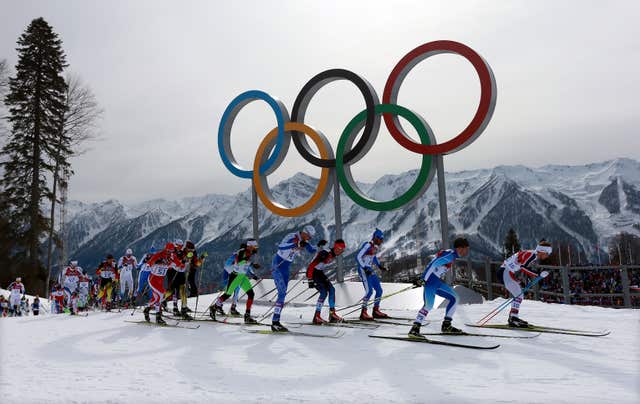Russia will be able to compete in Euro 2020 next summer even if a four-year ban from sporting events comes into effect.
Investigators from the World Anti-Doping Agency found inconsistencies in laboratory data obtained from the Russian anti-doping agency in January and WADA’s independent compliance review committee is recommending Russia be barred from hosting and competing in major international events for four years.
However, the PA news agency understands next summer’s football European Championship – which Russia have qualified for and where St Petersburg will serve as one of 12 host cities – will not be affected even if WADA’s executive committee and the Court of Arbitration back the proposed sanctions.
🇷🇺 Russia secure their place at #EURO2020! 🥳
Congrats, @TeamRussia 👏👏👏 pic.twitter.com/IkmxbkWsy2
— UEFA EURO 2020 (@UEFAEURO) October 13, 2019
That is because the International Standard for Code Compliance by Signatories (ISCCS) which sets out the rules on anti-doping breaches does not define UEFA as a ‘Major Event Organisation’.
The definition states that Major Event Organisations are “continental associations of National Olympic Committees and other international multisport organisations that function as the ruling body for any continental,
regional or other international event”.
Because UEFA is only concerned with a single sport, it is not covered.

Russia does face being barred from the Olympic and Paralympic summer and winter Games of 2020 and 2022, although individual athletes will be able to compete independently “where they are able to demonstrate that they are not implicated in any way by the non-compliance”.
The International Olympic Committee welcomed that aspect of the CRC’s report, and called for the toughest sanctions to be brought against those responsible for manipulating drug-test data, describing the attempts to cover up positive findings as “an insult to the sporting movement worldwide.”
The code does cover single sport world championships, so there will also be serious question marks over whether Russia can enter qualification for the 2022 World Cup in Qatar.
A statement from FIFA on Tuesday read: “We will await the final considerations of the WADA executive committee on this matter until any potential material decision is taken by FIFA. FIFA is in permanent contact with WADA and ASOIF (the Association of Summer Olympic International Federations) in this regard.”
The laboratory data in question covers a period from January 2012 to August 2015. WADA investigators found that “hundreds” of positive findings contained in a version of the Moscow lab data obtained from a whistleblower in 2017 were missing from the data obtained in January 2019, which had been requested under the terms of Russia’s reinstatement to compliance in September 2018.
WADA’s compliance review committee, in setting out its recommendations, stated that the data was “neither complete nor fully authentic”.
WADA investigators found the positive findings had been removed and that efforts had been made to conceal this removal, constituting what the CRC described as “an extremely serious case of non-compliance with the requirement to provide an authentic copy of the Moscow data, with several aggravating features”.
If WADA’s executive committee endorses the recommendation at its meeting in Paris on December 9, and Russia contests it, then the Court of Arbitration for Sport will make a final ruling on the matter.
WADA publishes approved 2021 World Anti-Doping Code and International Standards: https://t.co/soD0ofvAgn
— WADA (@wada_ama) November 26, 2019
United States Anti-Doping Agency boss Travis Tygart urged WADA to take the toughest possible action after accusing Russia of “fraudulent and bullying behaviour”.
USADA CEO Tygart says Russia will not change its ways until WADA comes down on them hard.
“Russia continues to flaunt the world’s anti-doping rules, kick clean athletes in the gut and poke WADA in the eye and get away with it time and time again,” Tygart said in a statement.
“WADA must stand up to this fraudulent and bullying behaviour as the rules and Olympic values demand.
“The response proposed by the CRC is inadequate especially given the deceit perpetuated by the Russian sport system which is controlled by the government.”
He said the response to Russian doping used in Rio 2016 and PyeongChang 2018 did not work.
“The world’s athletes saw through this charade and it apparently only emboldened Russia to simply destroy evidence and to tamper with more samples to make it impossible to confirm whether any clean Russian athletes actually exist,” Tygart said.
“WADA must get tougher and impose the full restriction on Russian athlete participation in the Olympics that the rules allow.
“Only such a resolute response has a chance of getting Russia’s attention, changing behaviour, and protecting today’s clean athletes who will compete in Tokyo, as well as future generations of athletes in Russia who deserve better than a cynical, weak response to the world’s repeated calls for Russia to clean up its act.
“It is sad when a country’s athletes suffer for the fraud of the governmental and sport system they represent.
“However, the failure to stand up to Russia’s five-year flaunting of the rules would cause even more harm to athletes in and outside of Russia. The time for the toughest penalty available is now.”
/https%3A%2F%2Fsportsmole-media-prod.s3.gra.io.cloud.ovh.net%2F19%2F41%2Frussco.jpg)
/https%3A%2F%2Fsportsmole-media-prod.s3.gra.io.cloud.ovh.net%2F21%2F12%2Fruslog.png) Russia
Russia
/https%3A%2F%2Fsportsmole-media-prod.s3.gra.io.cloud.ovh.net%2Fuploads%2F2025%2F11%2Fimago1047010138-6911b69ca160b914129700.jpg)
/https%3A%2F%2Fsportsmole-media-prod.s3.gra.io.cloud.ovh.net%2F24%2F23%2Fmichel-platini.jpg)
/https%3A%2F%2Fsportsmole-media-prod.s3.gra.io.cloud.ovh.net%2F23%2F41%2Fcarlos-ferrer.jpg)
/https%3A%2F%2Fsportsmole-media-prod.s3.gra.io.cloud.ovh.net%2Fuploads%2F2025%2F11%2Festevao-6926501e3975b566659219.jpg)
/https%3A%2F%2Fsportsmole-media-prod.s3.gra.io.cloud.ovh.net%2Fuploads%2F2025%2F11%2Foleksandr-romanchuk-69264839a6a12640016747.jpg)
/https%3A%2F%2Fsportsmole-media-prod.s3.gra.io.cloud.ovh.net%2Fuploads%2F2025%2F11%2Falonso-4-69264774b3d57305917036.jpg)
/https%3A%2F%2Fsportsmole-media-prod.s3.gra.io.cloud.ovh.net%2Fuploads%2F2025%2F11%2Fdelap-6-69263f59e370d977534812.jpg)